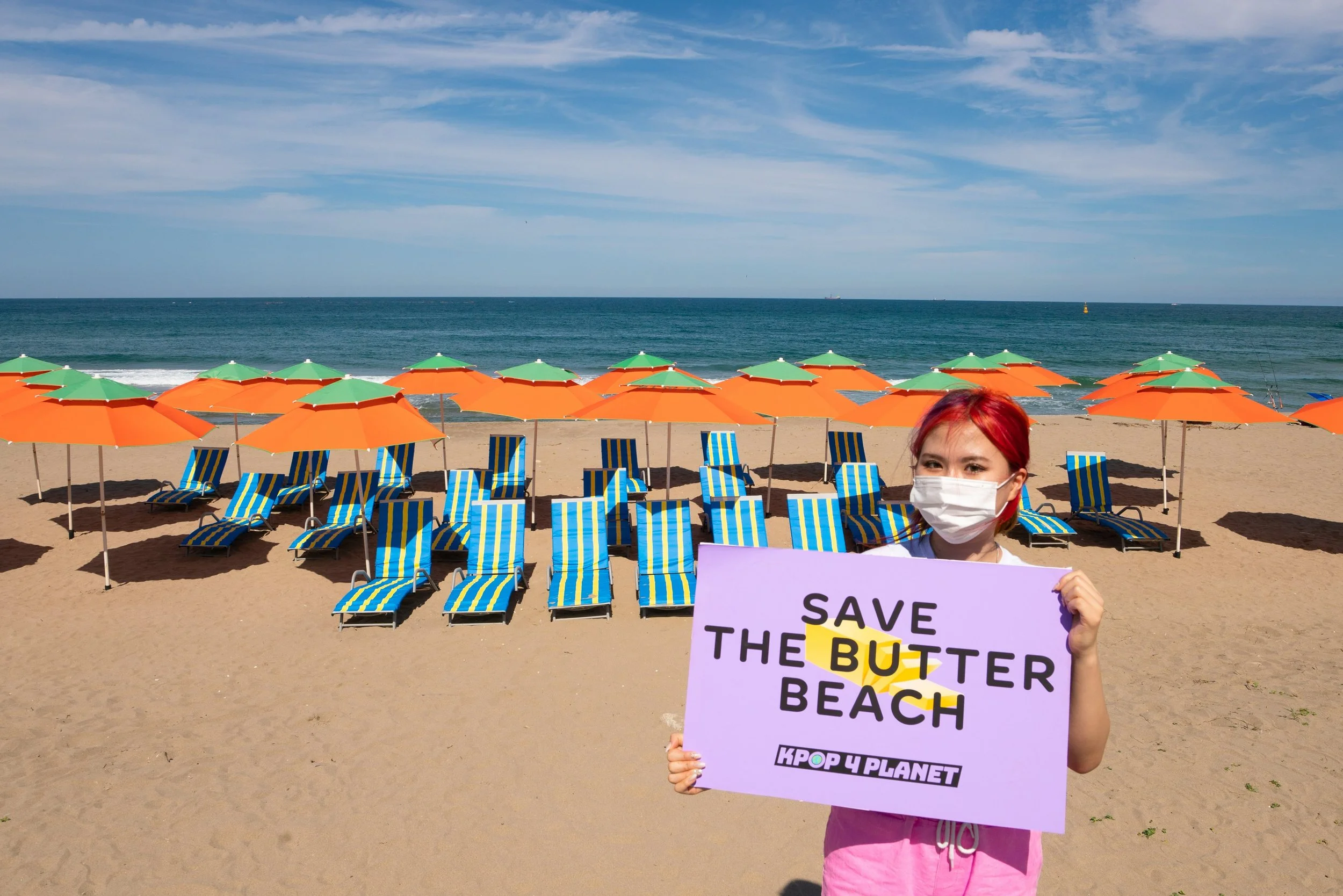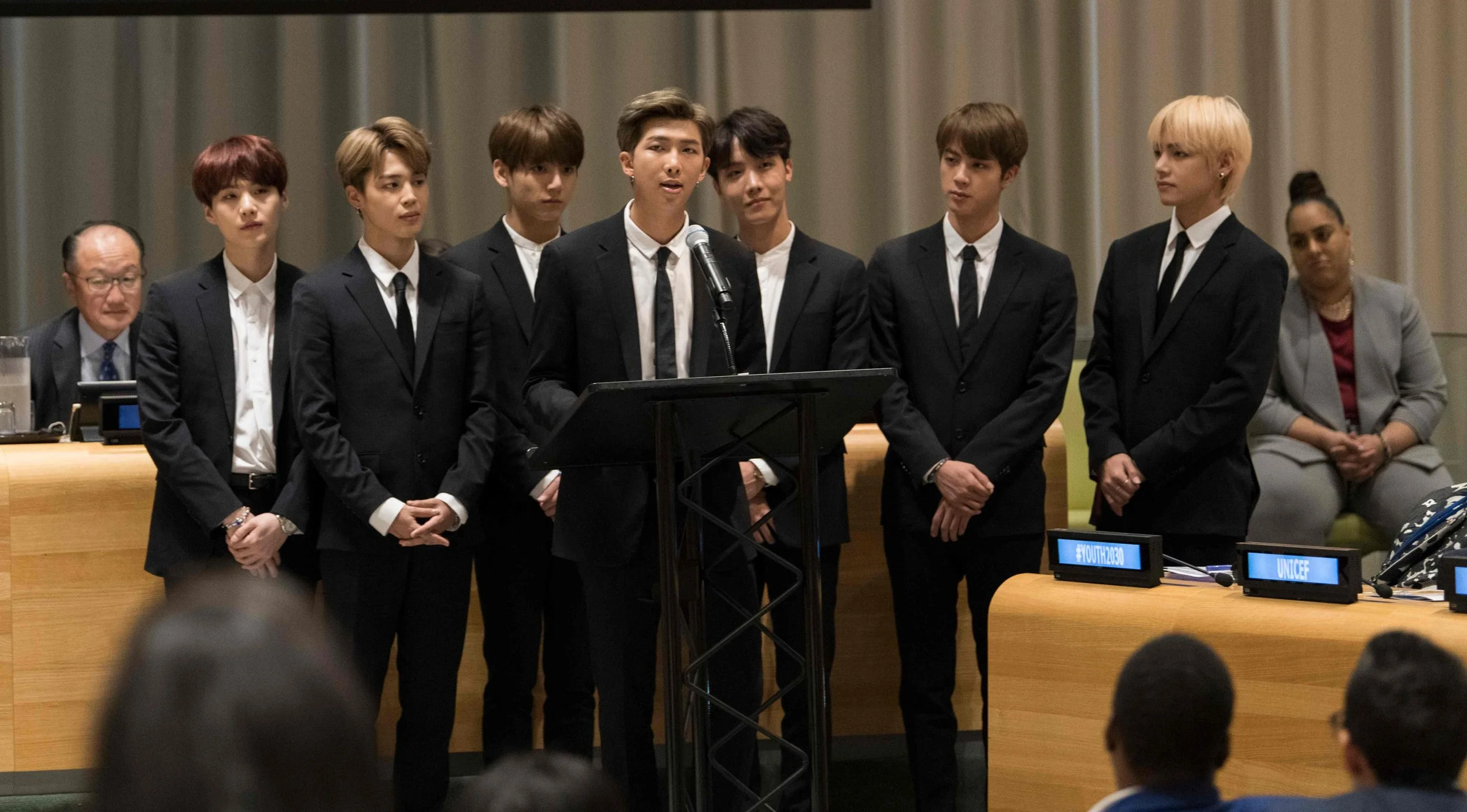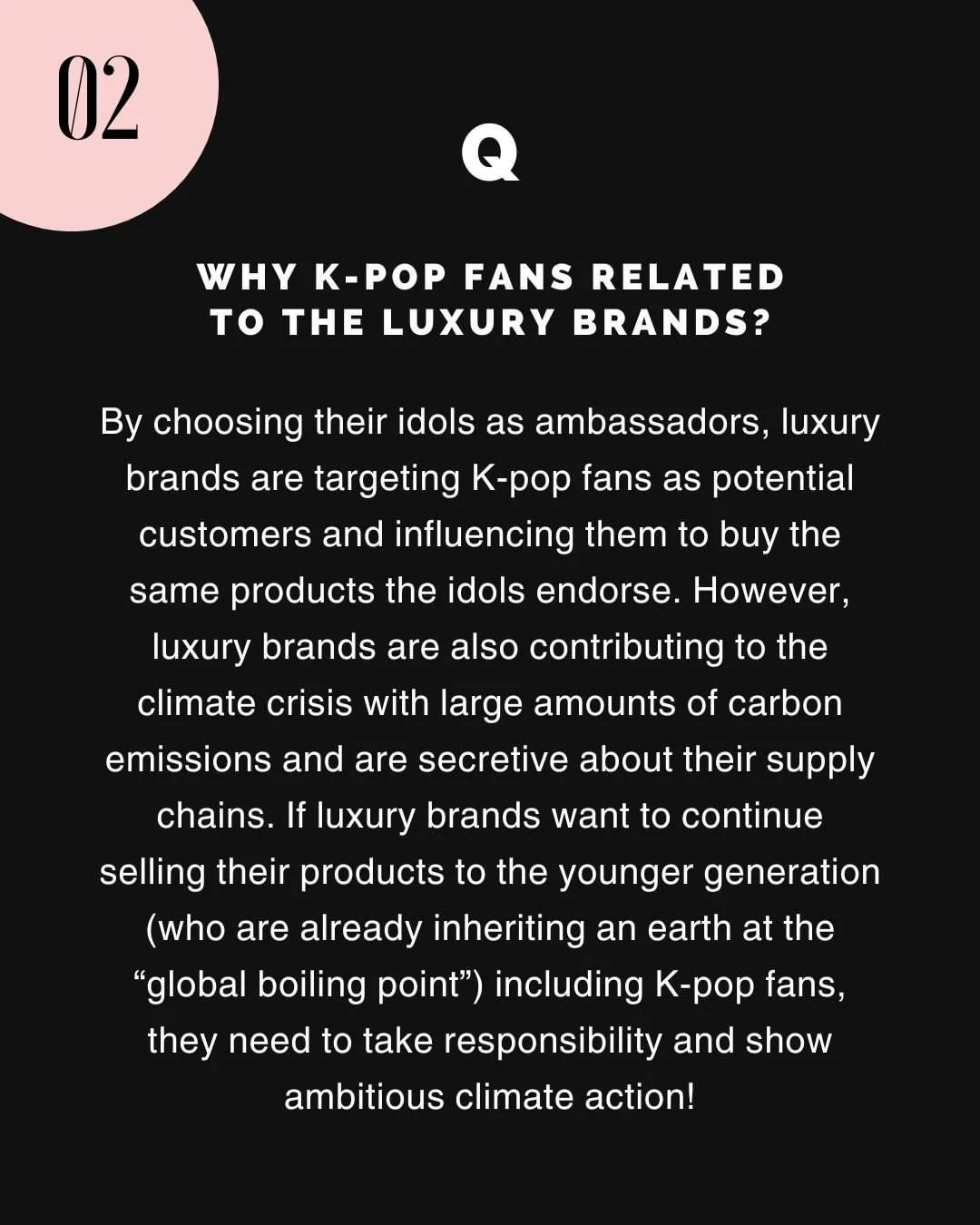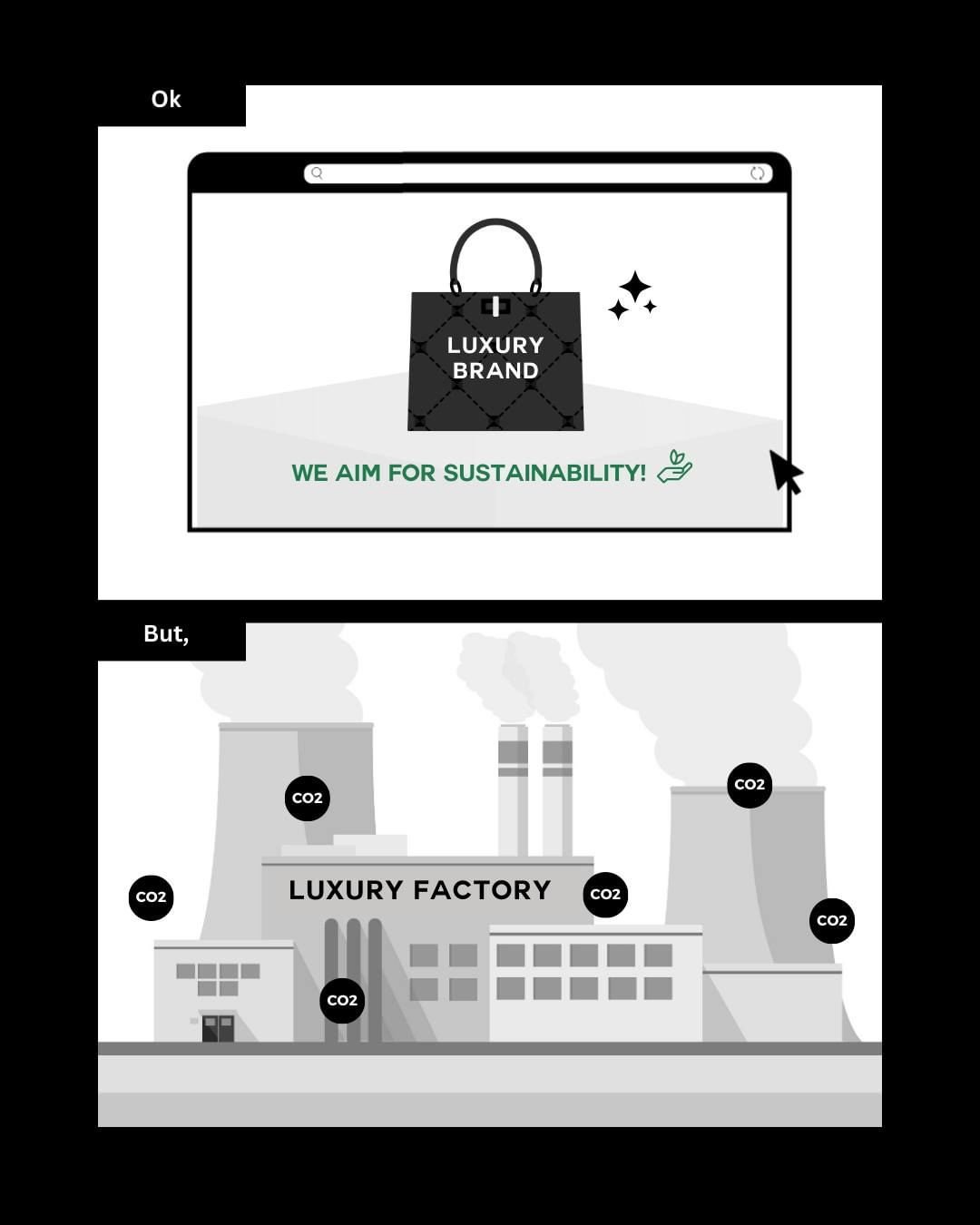Is K-Wave Driving Overtourism or Molding a New Generation of Climate Activists?
A BTS fan protesting against a plan of building a coal-burning power plant on a beach made popular by the group’s hit song Butter. Photo by: Kpop4planet
The Korean Wave (K-Wave), or Hallyu, encompasses various aspects of Korean culture such as drama, pop music, beauty trends, and gastronomy. While it may seem unrelated to sustainability, it offers valuable insights into smart collaboration and diversification to build engaging audiences and promote sustainable choices in consumption and travel.
However, the K-wave is not without its controversies. The Korean entertainment industry has been criticized for its intense work schedule, which has taken a toll on the physical and mental health of celebrities. Many argue that it has also contributed to overconsumption and overtourism.
Despite these concerns, it would be a mistake to dismiss the movement and overlook its achievements. Instead, we can focus on learning how the K-Wave has become a cultural phenomenon that it is today.
K-Wave: Beyond the Surface
Very few trends have had the kind of staying power and scope of impact and influence like K-wave coming out of Asia in the past two decades.
It is no longer surprising to see a Brazilian Gen Z wanting to learn Korean or a Tunisian millennial engrossed in Korean shows and dancing to BTS music.
This cultural impact extends to tourism. Travelers flock to locations popularized by Korean shows and music videos.
The Korean Tourism Organization reported that K-wave-related tourism contributed to a staggering $1.1 billion in tourist spending before the pandemic. Concerts by Korean celebrities in foreign countries have even led to profound economic effects. The two-day BLACKPINK concert reportedly accounted for 8% of Vietnam’s foreign arrivals in July and generated $26.5M in tourism earnings.
Hanoi received 170,000 visitors, of whom 30,000 were foreigners, or 8% of total foreign arrivals in July, according to the city Department of Tourism. Photo by: Blackpink's Instagram
But not everyone welcomes this kind of overwhelming influx of K-Wave-induced tourism.
A small Spanish resort in Costa Brava is devising a plan to protect the community as it has become swarmed with Chinese and Korean tourists eager to capture selfies at the same locations where a Korean pop star filmed two of her latest music videos.
Photo by: Medium
This raises the question: why aren't Korean idols using their global influence to promote climate action?
K-Pop and Climate Action
In 2021, BTS delivered a speech on Climate Change at the UN General Assembly and then teamed up with Samsung for a climate change awareness campaign called “Galaxy For The Planet.”
While the impact of these initiatives is debated, they illustrate the power of K-wave's soft influence.
South Korean music group BTS called on young people to take climate action in their speech at the UN General Assembly in 2021. Photo by: AFP/Getty Images
Lessons for Sustainability
When the South Korean government began investing in building an entertainment industry in the late 1990s, there was no immediate need or demand for Korean entertainment content. After all, the world already had Hollywood, Bollywood, Swedish pop groups, and the BBC.
However, the government was determined to create this demand from the get-go and gradually built an aspiration to be associated with Korea. South Korea's proactive promotion of its pop culture, traditional art, and "Kimchi Diplomacy," has boosted its image and influence on the global stage. This has helped foster a positive international perception of Korean identity worldwide.
Having said that, Asian and global brands are leveraging the influence of South Korean idols to reach new target audiences. In fact, Indonesia is collaborating with the K-pop industry to create its global phenomenon 'Indonesian Wave'.
The good news for sustainability-led businesses is that people already want to be associated with a sustainable lifestyle.
The sustainable tourism movement can adopt the strategies behind K Wave, to grow from a niche trend to an aspirational yet accessible stable.
Moon-shot collaborations
For many travelers, sustainable travel means two things: paying a high price for inaccessible off-the-beaten-track experiences or staying at basic eco-lodges to minimize impact.
However, it is time to shift this perception and expand the sustainable travel sector from a more inclusive standpoint. By doing so, travelers will benefit from a wider variety of sustainable travel services that cater to their needs and preferences.
For sustainable tourism to become the industry’s norm, we need to build a network of collaborators and allies to produce compelling content and actively participate in important discussions, platforms, and debates.
Equally important is working with individuals who know how to shift minds and change the hearts of tourism players and travelers.
In an effort to modernize the sound and enhance the quality of Korean music to appeal to a global audience, Korean music labels began working with top-tier non-Korean talents such as U.S. music producers who had previously worked with Michael Jackson.
Drawing inspiration from the Korean entertainment industry's approach, sustainable travel players can also leverage the power of diverse partnerships to their advantage.
Forward-thinking diversification strategy
China’s ban on K-wave in 2017 caused huge financial losses to the Korean cultural industry, but more importantly, the incident forced the Korean cultural industry to reduce its reliance on the Chinese market and invest in international markets beyond Asia.
In 2019, China accounted for 20% of international arrivals to Thailand, prompting Thai tourism officials to implement various strategies to attract Chinese tourists back to the country in recent months. This illustrates the importance of having diverse source markets to create a resilient tourism industry.
Kpop4planet: K-pop Fandoms Hold Brands to Account
With young people making up the majority of K-pop fandoms, they possess a keen awareness of the climate crisis. A notable practice among these fans is planting trees to celebrate their idols’ birthdays.
Kpop4planet, an international youth-led coalition of K-pop fans to fight for climate justice, has engaged in protests and campaigns targeting brands endorsed by idols, highlighting the potential for fan communities to drive positive change.
The group’s latest campaign "High Fashion, High Carbon'' called out luxury brands for failing to meet their sustainability commitments.
The scale of fighting back to get to where we need to go is beyond the efforts of K-pop fans alone. Just like in tourism, while we can encourage travelers to take action, it is equally important for businesses to do their part to meet today’s challenge.
Photos by: Kpop4planet
Top takeaways for sustainable travel from K-wave
It highlights the importance of building diverse communities, much like the vibrant fandoms of K-wave.
These communities have the potential to drive commerce, strengthen culture, and hold us accountable for the sustainability goals we're all striving to achieve.
The Korean Wave's global success also offers insightful lessons to tourism professionals on the power of strategic planning, international collaborations, and agile audience engagement to address this intersectional topic.
To make sustainable travel a norm, it must be accessible, aspirational, and fun.












